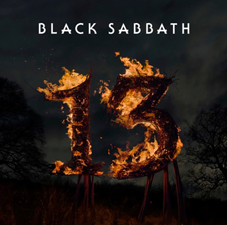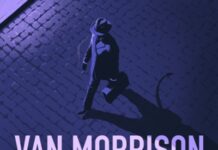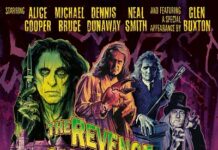There’s a ton of expectation attached to well-known creative entities with big gaps in their working histories. The good news is that living up to a legacy can be dealt with from various angles. There’s the what-the-hell approach where you simply transform into a completely different creative entity and do something…well, completely different. End result: The eclectic hardcores will get it and the masses will scratch their noggins. Whether the public buys it depends on who, when, where and probably why. Then there’s the let’s-do-what-the-backer-wants (if, in fact, they are backer-worthy — backer being the publisher, the record label, the movie studio, etc.). At this point, it’s out of your hands and where it lands is anyone’s guess. The third approach, which zeroes in on classic rock artists for our purposes, is the most novel, perhaps the most obvious. It consists of looking at one’s past achievements and trying to replicate them as much as possible. You know, sort of like what Van Halen did in 2012 on A Different Kind Of Truth — and what innumerable others have been trying to do as well — recapturing that lightening in a bottle. For 13, their first full studio release with Ozzy Osbourne in 35 years, this is the path Black Sabbath has taken.
It won’t be here until June, but I did get in on an exclusive first listen of Black Sabbath’s 13 on April 10 in Hollywood. It was a rather cool and low-key affair…comp drinks, Fritos and M&M’s with Jack Osbourne as the MC. Seated in the theater, a handful of journalists and invited guests were greeted by Ozzy’s son, who introduced a short film he made about the making of the album. Then it was time for the album itself. I scanned the room and figured maybe a third of guys and gals here might have actually seen Ozzy with Sabbath back in the 70s. Not that it matters, but to the degree that Sabbath spent on recreating those days, it might alter the perspective somewhat from those who have conjured Ozzy with Sabbath as a childhood dream, the end all to be all of heavy metal.
Of course, Black Sabbath is not really a metal band, certainly not by today’s standards. They may be revered as the Godfathers of the genre and they point their headstocks in that direction, but if you listen to the classic Sabbath albums — loaded up with Iommi’s distortion, Geezer’s heavy bass, Bill Ward’s swing and Ozzy’s wistful vocal — well, it’s pretty much straight blues all soaked in volume and darkness. Anyway, Black Sabbath approached the making of 13 the only way they could at this point in history: The record had to contain all the elements of what made Black Sabbath such a great band in the 70s. Like scientists in a laboratory, The band and producer Rick Rubin went about mixing the potion, undoubtedly listening intently to past works, especially the self-titled debut, Master Of Reality and Sabotage, arguably the last truly great Black Sabbath album from 1975.
The first track on 13 is an eight-minute monolith called “End Of The Beginning,” with Osbourne intoning the twist of (paraphrasing), “This is the end of the beginning or the beginning of the end…” It is very much a hybrid, spawned from the song “Black Sabbath,” perhaps a bit intentional and contrived in its approach. Nevertheless, Iommi’s leads blaze and the track is solid. “God Is Dead?” starts off a little mellower, but builds into a heavy barrage, reminiscent of “Hole In The Sky.” Once again, the real star is Iommi, whose tone and technique have always been at the heart of what Black Sabbath is really about.
Shadows of famous Sabbath moments continue to wedge their way in. “Loner” gets its inspiration from “N.I.B.,” while “Zeitgeist” borrows heavily from “Solitude.” It really isn’t until we arrive at ‘Age Of Reason” that the album finally finds a voice of its own. Osbourne asserts his vocal prowess as Butler booms to the rhythm set up with little fuss by drummer Brad Wilk. As able-bodied and in-the-pocket as the Rage Against The Machine drummer may be, he still isn’t given much of a chance to step out and shine — something Bill Ward did magnificently on those classic Sabbath albums from the 70s. “Live Forever,” “Damaged Soul” and “Dear Father” aggressively, methodically move 13 forward to its conclusion, neither solidifying the collection nor straying from its sonic firepower. Indeed, there is little doubt Rubin gobbled up those Sabbath signatures to create something momentous and big enough to give your sub-woofers a kick. However, in the midst of pushing the performances and plying the riffs, rumbles, vocal banshees and stock evilness for authenticity, Rubin sidestepped the emblematic hooks that embedded songs like “Paranoid” and “Iron Man” into the public consciousness. That seems to be something only young bands with little to lose are doing.
For a veteran band like Black Sabbath, the odds for creative meandering are stacked. There’s little to no margin for error because everyone already has their own idea of how it’s supposed to sound. That sense of adventure is swapped out for a sense of familiarity. Maybe that’s why 13 is everything we should expect from Black Sabbath at this stage in their story. Working around obstacles like Ward’s departure or Iommi’s cancer may have even emboldened them to make it more user-friendly, without risk or alienation. A safe and sane ride, 13 is predictably delightful without being excessively insightful — perfect for the Black Sabbath fan more in tune with nostalgia than reinvention.
~ Shawn Perry




















